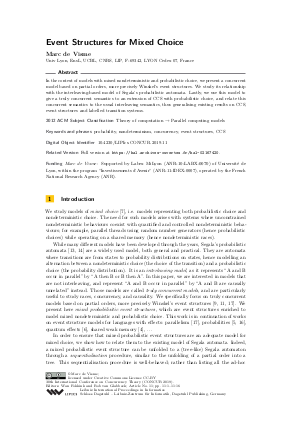Event Structures for Mixed Choice
Author Marc de Visme
-
Part of:
Volume:
30th International Conference on Concurrency Theory (CONCUR 2019)
Part of: Series: Leibniz International Proceedings in Informatics (LIPIcs)
Part of: Conference: International Conference on Concurrency Theory (CONCUR) - License:
 Creative Commons Attribution 3.0 Unported license
Creative Commons Attribution 3.0 Unported license
- Publication Date: 2019-08-20
File

PDF
LIPIcs.CONCUR.2019.11.pdf
- Filesize: 0.57 MB
- 16 pages
Document Identifiers
Related Versions
-
Full version at https://hal.archives-ouvertes.fr/hal-02167420.
Subject Classification
ACM Subject Classification
- Theory of computation → Parallel computing models
Keywords
- probability
- nondeterminism
- concurrency
- event structures
- CCS
Metrics
- Access Statistics
-
Total Accesses (updated on a weekly basis)
0Document
0Metadata
Abstract
In the context of models with mixed nondeterministic and probabilistic choice, we present a concurrent model based on partial orders, more precisely Winskel’s event structures. We study its relationship with the interleaving-based model of Segala’s probabilistic automata. Lastly, we use this model to give a truly concurrent semantics to an extension of CCS with probabilistic choice, and relate this concurrent semantics to the usual interleaving semantics, thus generalising existing results on CCS, event structures and labelled transition systems.
Cite As Get BibTex
Marc de Visme. Event Structures for Mixed Choice. In 30th International Conference on Concurrency Theory (CONCUR 2019). Leibniz International Proceedings in Informatics (LIPIcs), Volume 140, pp. 11:1-11:16, Schloss Dagstuhl – Leibniz-Zentrum für Informatik (2019)
https://doi.org/10.4230/LIPIcs.CONCUR.2019.11
BibTex
@InProceedings{devisme:LIPIcs.CONCUR.2019.11,
author = {de Visme, Marc},
title = {{Event Structures for Mixed Choice}},
booktitle = {30th International Conference on Concurrency Theory (CONCUR 2019)},
pages = {11:1--11:16},
series = {Leibniz International Proceedings in Informatics (LIPIcs)},
ISBN = {978-3-95977-121-4},
ISSN = {1868-8969},
year = {2019},
volume = {140},
editor = {Fokkink, Wan and van Glabbeek, Rob},
publisher = {Schloss Dagstuhl -- Leibniz-Zentrum f{\"u}r Informatik},
address = {Dagstuhl, Germany},
URL = {https://drops.dagstuhl.de/entities/document/10.4230/LIPIcs.CONCUR.2019.11},
URN = {urn:nbn:de:0030-drops-109137},
doi = {10.4230/LIPIcs.CONCUR.2019.11},
annote = {Keywords: probability, nondeterminism, concurrency, event structures, CCS}
}
Author Details
Funding
- de Visme, Marc: Supported by Labex MiLyon (ANR-10-LABX-0070) of Université de Lyon, within the program "Investissements d'Avenir" (ANR-11-IDEX-0007), operated by the French National Research Agency (ANR).
References
- Jos C. M. Baeten. A brief history of process algebra. Theor. Comput. Sci., 335(2-3):131-146, 2005. URL: https://doi.org/10.1016/j.tcs.2004.07.036.
- Christel Baier and Marta Z. Kwiatkowska. Domain equations for probabilistic processes. Electr. Notes Theor. Comput. Sci., 7:34-54, 1997. URL: https://doi.org/10.1016/S1571-0661(05)80465-7.
- Jan A. Bergstra and Jan Willem Klop. Process Algebra for Synchronous Communication. Information and Control, 60(1-3):109-137, 1984. URL: https://doi.org/10.1016/S0019-9958(84)80025-X.
- Simon Castellan. Weak memory models using event structures. In Julien Signoles, editor, Vingt-septièmes Journées Francophones des Langages Applicatifs (JFLA 2016), Saint-Malo, France, January 2016. URL: https://hal.inria.fr/hal-01333582.
- Simon Castellan, Pierre Clairambault, Hugo Paquet, and Glynn Winskel. The Concurrent Game Semantics of Probabilistic PCF. In Proceedings of the 33rd Annual ACM/IEEE Symposium on Logic in Computer Science, LICS '18, pages 215-224, New York, NY, USA, 2018. ACM. URL: https://doi.org/10.1145/3209108.3209187.
- Pierre Clairambault, Marc de Visme, and Glynn Winskel. Game semantics for quantum programming. PACMPL, 3(POPL):32:1-32:29, 2019. URL: https://dl.acm.org/citation.cfm?id=3290345, URL: https://doi.org/10.1145/3290345.
- Jean Goubault-Larrecq. Isomorphism theorems between models of mixed choice. Mathematical Structures in Computer Science, 27(6):1032-1067, 2017. URL: https://doi.org/10.1017/S0960129515000547.
- Oltea Mihaela Herescu and Catuscia Palamidessi. Probabilistic asynchronous pi-calculus. CoRR, cs.PL/0109002, 2001. URL: http://arxiv.org/abs/cs.PL/0109002.
- Gilles Kahn, editor. Semantics of Concurrent Computation, Proceedings of the International Symposium, Evian, France, July 2-4, 1979, volume 70 of Lecture Notes in Computer Science. Springer, 1979. URL: https://doi.org/10.1007/BFb0022459.
- Robin Milner. Lectures on a Calculus for Communicating Systems. In Seminar on Concurrency, Carnegie-Mellon University, Pittsburg, PA, USA, July 9-11, 1984, pages 197-220, 1984. URL: https://doi.org/10.1007/3-540-15670-4_10.
- Mogens Nielsen, Gordon D. Plotkin, and Glynn Winskel. Petri Nets, Event Structures and Domains. In Gilles Kahn, editor, Semantics of Concurrent Computation, Proceedings of the International Symposium, Evian, France, July 2-4, 1979, volume 70 of Lecture Notes in Computer Science, pages 266-284. Springer, 1979. URL: https://doi.org/10.1007/BFb0022474.
- Mogens Nielsen and Erik Meineche Schmidt, editors. Automata, Languages and Programming, 9th Colloquium, Aarhus, Denmark, July 12-16, 1982, Proceedings, volume 140 of Lecture Notes in Computer Science. Springer, 1982. URL: https://doi.org/10.1007/BFb0012751.
- Roberto Segala. Modeling and verification of randomized distributed real-time systems. PhD thesis, Massachusetts Institute of Technology, Cambridge, MA, USA, 1995. URL: http://hdl.handle.net/1721.1/36560.
- Ana Sokolova and Erik P. de Vink. Probabilistic Automata: System Types, Parallel Composition and Comparison. In Validation of Stochastic Systems - A Guide to Current Research, pages 1-43, 2004. URL: https://doi.org/10.1007/978-3-540-24611-4_1.
- Daniele Varacca, Hagen Völzer, and Glynn Winskel. Probabilistic event structures and domains. Theor. Comput. Sci., 358(2-3):173-199, 2006. URL: https://doi.org/10.1016/j.tcs.2006.01.015.
- Daniele Varacca and Nobuko Yoshida. Probabilistic pi-Calculus and Event Structures. Electr. Notes Theor. Comput. Sci., 190(3):147-166, 2007. URL: https://doi.org/10.1016/j.entcs.2007.07.009.
- Glynn Winskel. Event Structure Semantics for CCS and Related Languages. In Mogens Nielsen and Erik Meineche Schmidt, editors, Automata, Languages and Programming, 9th Colloquium, Aarhus, Denmark, July 12-16, 1982, Proceedings, volume 140 of Lecture Notes in Computer Science, pages 561-576. Springer, 1982. URL: https://doi.org/10.1007/BFb0012800.
- Glynn Winskel. Event Structures. In Petri Nets: Central Models and Their Properties, Advances in Petri Nets 1986, Part II, Proceedings of an Advanced Course, Bad Honnef, Germany, 8-19 September 1986, pages 325-392, 1986. URL: https://doi.org/10.1007/3-540-17906-2_31.
- Glynn Winskel. Event Structures with Symmetry. Electr. Notes Theor. Comput. Sci., 172:611-652, 2007. URL: https://doi.org/10.1016/j.entcs.2007.02.022.
- Glynn Winskel. Probabilistic and Quantum Event Structures. In Horizons of the Mind. A Tribute to Prakash Panangaden - Essays Dedicated to Prakash Panangaden on the Occasion of His 60th Birthday, pages 476-497, 2014. URL: https://doi.org/10.1007/978-3-319-06880-0_25.
